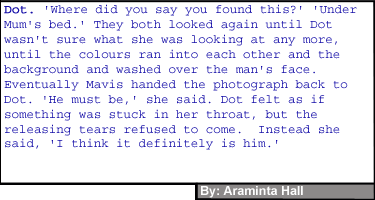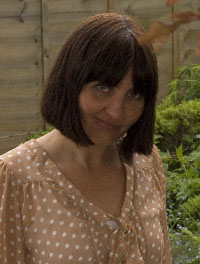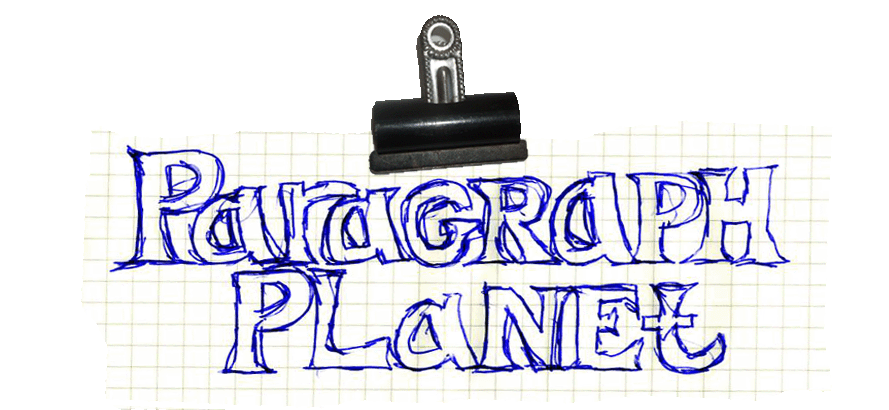Araminta Hall Interview
Araminta talks to Paragraph Planet about her new novel 'Dot'


1 - Tell me about your latest novel 'Dot'.
In my mind Dot is about quite a few different things. I initially wanted to write a story about three generations of women living together in a remote way both physically and emotionally. But as with all stories it evolved and came to include more characters. It is told from many different perspectives and jumps time zones, so that hopefully the reader is always getting a fresh take on situations. Intrinsically it is the story of Dot and her search for her father in an attempt to complete her picture of herself as she embarks on adulthood. He left on her second birthday and hasn�t been heard from since, but Dot in fact knows nothing about him as she has never had a conversation with her mother about him. In this way I see the book very much as a story about story-telling and the myths and tales and silences that build up within families. There are five very strong women in this story, all of whom are emotionally damaged and all of whom could help each other, if only they knew how to let love and friendship into their lives. I believe so strongly in the power of female relationships to transform and enrich lives and in a certain sense that is at the heart of this novel.
2 - Your last novel, Everything & Nothing was very well received, including being chosen for Richard & Judy's Book Club. Did that add to the pressure this time around?
I was so lucky with my first novel and was so grateful to be put in that position.
Of course I have felt pressure this time, but then again I can't imagine ever not feeling the pressure of writing
something that is well received and sells well. Books are so strange in that there is of course
no guarantee as to how they will be read and my publishers, Harper Collins, are so kind and helpful that
I would feel terrible if Dot didn't do well for them.
Writing is not a good job for the paranoid and at the moment I am constantly checking reviews and Amazon rankings!

3 - Can you describe your writing method this time around? Did it change?
Strangely I started writing Dot way before Everything and Nothing, about ten years ago in fact. I came up with the basic idea for the story and the characters of Dot, her mother Alice and grandmother, Clarice, but I couldn't get the story to work around them. It was very frustrating as I really wanted to tell their stories but couldn't find the right way to do it. I have put this novel away for years at a time and have in fact completely re-written it 4 times. Everything and Nothing on the other hand only took about a year and felt much easier to write. I doubt that I will ever again be able to write a novel in the way that Dot has evolved and, as I said at my book launch, I almost feel sad to see it published as it has been the piece of writing that I've always had to tinker with for so long now, I'll probably always see things to change.
4 - Do you believe in Writer's block? If so, how do you combat it?
No, I really don't. I live in Brighton and teach Creative Writing from a cabin in my garden with fellow novelist and journalist, Lizzie Enfield, and that is a question we get asked at pretty much every session. My answer is always the same; two things make you a writer, an insatiable desire to read and write. My best advice to anyone wanting to write is just to sit down and do it without worrying how good it is, how long it's going to be or even sometimes where it's going. This is your first draft and first drafts are never published. When I am writing my second (or third, fourth) drafts I do spend a lot of time starting into space trying to find the right words or resolve problems. But this is different from writers block in that you know where you are going, you just need time to get there.
5 - Any advice for aspiring writers?
Start by reading books you love. Don't be a book snob as what you love to read will probably be what you love to write. Then just sit down and do it. I always start with characters, but plots are vitally important as well; don't be fooled into thinking that stories don't matter as they underpin everything. Avoid cliches and make your strands fit together, clunky resolutions feel exactly like that, clunky and unreal. Also (and I know I would say this, but I mean it), go on a writing course. About 5 years into my attempts I did the MA in Creative Writing at Sussex University and I really believe I would not have been published without this. But if you can't commit to something so time-consuming then start with small courses; Lizzie and I specialise in one-day kick-start courses and we�ve had great feedback from people who just needed that push to get going. Also read literary magazines like Mslexia and enter short story competitions; they're great at making you stick to a deadline and, if you get placed or win, are a fantastic calling card to take to agents. Finally though only do it because you love it; very few writers earn enough to pay the bills, so I always say only write if you'd do it whether or not you get published. I know I would!
For creative writing courses run in Brighton, check out: The Writers Room
Paragraph Planet is a creative writing website which has been publishing one 75-word paragraph every day since November 2008. Famous authors, aspiring writers and occasional dabblers have all got involved, submitting a mixture of twist-in-the-tale flash fiction, evocative short, short fiction, openings of published novels or brief moments captured. Get involved here. You can read over 2000 examples in the archive section. There are also interviews with some of the published authors who have submitted to the site, as well as an authors page in which you can read an example paragraph from all authors who've submitted, and also link to dedicated pages with more info about regular contributors. There's also a Blog Directory of authors who've contributed to the site.



 Support Me on Ko-fi
Support Me on Ko-fi


